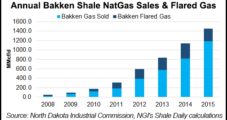The increase in global ethane emissions is the result of increased oil and natural gas activity in the Bakken Shale, according to University of Michigan (U-M) researchers.
Fugitive
Articles from Fugitive

Bakken Blamed for Rise in Global Ethane Emissions
The increase in global ethane emissions is the result of increased oil and natural gas activity in the Bakken Shale, according to University of Michigan (U-M) researchers.
Colorado State Launching Industry-Backed Methane Study
Researchers at Colorado State University (CSU) are beginning to collect data from possible fugitive methane emissions sources in natural gas transmission systems in an effort to quantify the amount of the greenhouse gas that is escaping.
Shale Plays Make Gas ‘Cost-Effective’ for Electricity Generation
The nation’s natural gas resources, which have grown with the expanded potential of shale plays — including as much as 20 years supply from the Marcellus Shale — can be used to cost-effectively generate electricity, and any environmental burdens will come primarily from combustion when the fuel is used, not when it is extracted, according to a report from the Department of Energy (DOE).
New York Governor Will Reportedly Allow Fracking in Five Counties
New York Gov. Andrew Cuomo’s administration is reportedly working on a plan to allow hydraulic fracturing (fracking) in five counties along the Pennsylvania border in the Marcellus Shale, but only in localities that support the practice.
Federal Agencies to Collaborate on Air Quality
Three federal agencies say they will cooperate on air quality issues for onshore oil and gas projects drilled on public lands and will create a new agency to implement collaborative plans by late September.
Air Group Claims Barnett Emissions Costing Industry
The value of fugitive natural gas and condensate air emissions in the Barnett Shale of North Texas is about $52 million a year, according to research paid for by a clean air group, which asserts that “simple air pollution control devices” would capture this lost revenue if they were installed in the nine-county nonattainment area around Dallas-Fort Worth (DFW).




